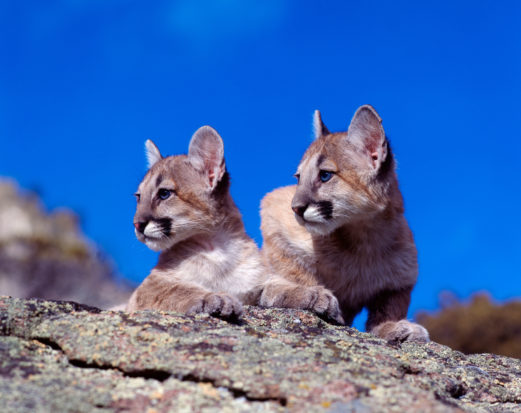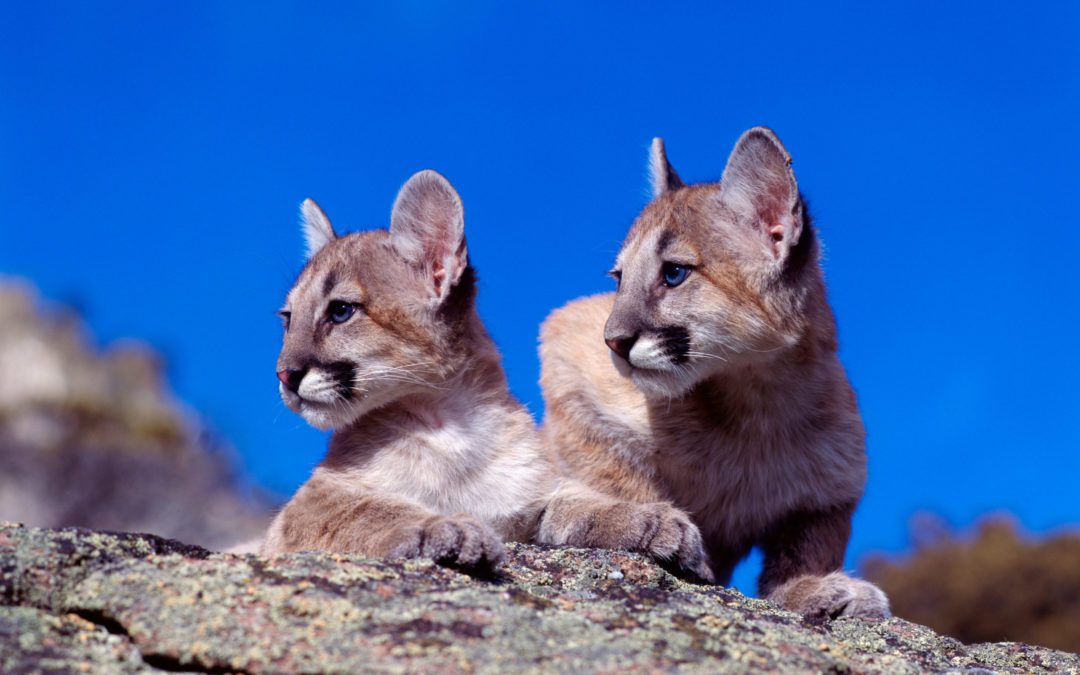
When wild kittens are orphaned by trophy hunters, they are left to fend for themselves, often coming into close contact with humans in their search for food. Alamy Stock Photo
Earlier this month, an emaciated mountain lion found his way into a condominium complex in Vail, Colorado. Images show a very scared, skinny cat with light spots, indicating that he was still very young and not old enough to survive on his own. This mountain lion, with no mother in sight, was likely starving to death as a result of being orphaned. Instead of sending him to a wildlife rehabilitation center, law enforcement officials killed him.
In 2019, when a trail runner in Fort Collins killed a mountain lion kitten in self-defense, Colorado Parks and Wildlife data showed that three adult female mountain lions had recently been killed in the area—two by trophy hunters and one in response to a livestock loss. The evidence made clear that the dead kitten, and two of his littermates later discovered by authorities, were in fact orphaned, with vegetation in their bellies, not something cats can digest. They had been desperate, eating anything they could find to survive.
Trophy hunting of wild cats is incredibly cruel, harming not only the individual cats who are maimed or killed, but also their entire social communities. When a trophy hunter kills a mother bobcat or mountain lion, her kittens are left to fend for themselves. Orphaned wild kittens often come into close contact with humans or starve to death without the care of their mothers. This terrible fate is preventable. Yet, as long as the trophy hunting of these animals occurs, the stories of wandering, orphaned kittens coming into close contact with humans will just keep surfacing.
Thankfully, people are joining us in our efforts to stop this injustice. Lawmakers in Colorado recently introduced Senate Bill 31 to end the trophy hunting of wild cats throughout the state. We at the Humane Society of the United States are leading the campaign to support this groundbreaking legislation, working closely with our bill sponsors to draft SB 31 and coordinating a large coalition to help pass this bill. If passed, SB 31 will end the recreational hunting of mountain lions and bobcats in Colorado, which would be groundbreaking progress in our fight to protect wild cats from trophy hunters. Currently, hunters are permitted to kill hundreds of mountain lions and thousands of bobcats in Colorado each year for nothing more than a trophy or bragging rights. These hunts can not only lead to wildlife conflicts with humans and livestock but are grisly acts in themselves. Hunters typically chase the cats down with packs of hounds, and bobcats are frequently trapped and then shot at close range to preserve their soft belly fur which is then sold on overseas markets.
And while Canada lynx are currently protected as a “threatened” species under the U.S. Endangered Species Act, the Colorado bill also includes lynx to protect them from trophy hunting in case they lose their federal protections. While the U.S. Fish and Wildlife Service recently attempted to remove protections for Canada lynx, a coalition of wildlife conservation organizations recently won a lawsuit that maintained protections, for now. SB 31 ensures that Canada lynx will never be trophy hunted in Colorado, no matter their future federal status.
The majority of Colorado voters support a ban on trophy hunting of wild cats, and we are hopeful that this groundbreaking legislation will soon pass. We are so grateful, too, to the champions of this bill, a powerhouse coalition of legislators including Sen. Sonya Jaquez Lewis (Boulder County), Sen. Joann Ginal (Fort Collins), Rep. Monica Duran (Wheat Ridge) and Rep. Judy Amabile (Boulder). If you are a Colorado resident, you can reach out to these bill sponsors and thank them for introducing SB 31, and sign this action alert stating your support of this bill. .
Follow Kitty Block on Twitter
The post Colorado lawmakers are trying to save wild cats by banning trophy hunting appeared first on A Humane World.
This content was originally published here.

